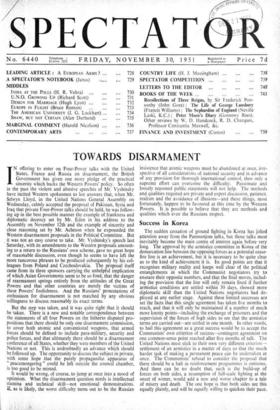Success in Korea
The sudden cessation of ground fighting in Korea has jolted attention away from the Panmunjom talks, but those talks must inevitably become the main centre of interest again before very long. The approval by the armistice committee in Korea of the demarcation line between the opposing forces as a potential cease- fire line is an achievement, but it is necessary to be quite clear as to the kind of achievement it is. Its good points are that it recognises military reality and keeps well clear of the political entanglements in which the Communist negotiators try to ensnare their opposite numbers, and that the final moves, includ- ing the provision that the line will only remain fixed if further armistice conditions are settled within 30 days, showed more diplomatic skill than the United Nations negotiators had de- ployed at any earlier stage. Against these limited successes are set the facts that this single agreement has taken five months to reach, and that it will only be maintained if a number of much more knotty points—including the exchange of prisoners and the supervision of the forces of NO sides to see that the armistice terms are carried out—are settled in one month. In other words, to hail this agreement as a great success would be to accept the Communists' own criterion of success—contingent agreement on one common-sense point reached after five months of talk. The United Nations must stick to their own very different criterion— settlement of an armistice in a matter of days so that the much harder task of making a permanent peace can be undertaken at once. The Communists' refusal to consider the proposal that there should be a halt in reinforcement programmes is ominous. And there can be no doubt that, such is the build-up of forces on both sides, a resumption of full-scale fighting at the onset of winter, would add a new and worse chapter to a tale of misery and death. The one hope is that both sides see this equally plainly, and will be equally willing to quicken their pace.


































